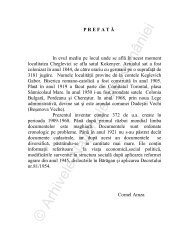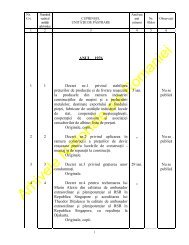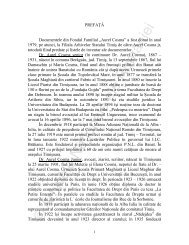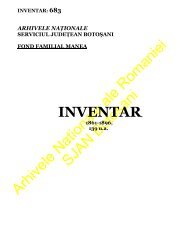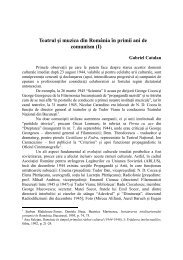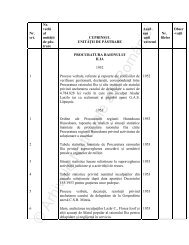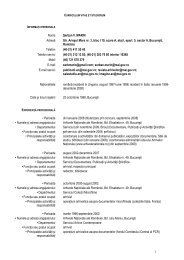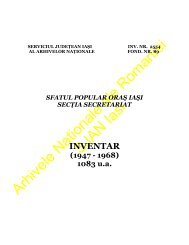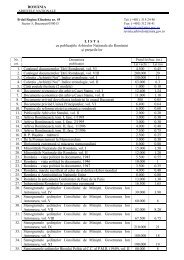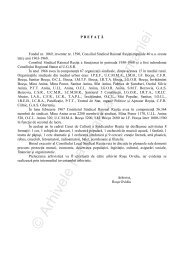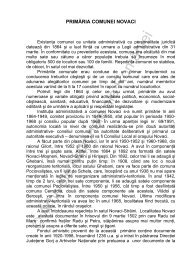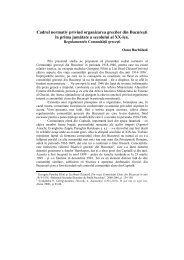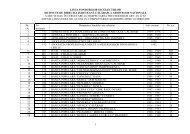Bogdan Popovici - Arhivele Naţionale ale României
Bogdan Popovici - Arhivele Naţionale ale României
Bogdan Popovici - Arhivele Naţionale ale României
Create successful ePaper yourself
Turn your PDF publications into a flip-book with our unique Google optimized e-Paper software.
B.-F. <strong>Popovici</strong>, Datele person<strong>ale</strong> şi accesul la arhive<br />
“[…] is not simply the right of any individual victim or closely related persons<br />
to know what happened, a right to the truth. The right to know is also a<br />
collective right, drawing upon history to prevent violations from recurring in the<br />
future. Its corollary is a «duty to remember», which the State must assume, in<br />
order to guard against the perversions of history that go under the names of<br />
revisionism or negationism; the knowledge of the oppression it has lived<br />
through is part of a people’s national heritage and as such must be<br />
preserved” 37 .<br />
“Therefore, the right to know the truth about past events is not only a right<br />
of individuals… but also of society as a collectivity and implies a duty to preserve<br />
memory, as well as guarantees to give effect to the right” 38 , datorie ce trebuie<br />
asumată de către Stat, prin serviciile de Arhive Naţion<strong>ale</strong>. În acest context, pare<br />
evident că rolul arhivelor şi arhiviştilor trebuie mult mai clar precizat în legislaţia de<br />
protecţie a datelor person<strong>ale</strong>, fie şi prin prisma faptului că aplicarea la nivel de<br />
creator de documente a prevederilor unei astfel de legislaţii poate duce la pierderea<br />
iremediabilă a informaţiilor înainte ca arhiviştii să îşi asume rolul de păstrători ai<br />
memoriei.<br />
Un alt aspect fundamental în care principiile profesion<strong>ale</strong> se ciocnesc de cele<br />
<strong>ale</strong> protecţiei datelor person<strong>ale</strong> îl reprezintă autorizarea modificării documentelor,<br />
pentru corectarea datelor eronate sau anonimizare 39 . Aşa cum remarca Malcolm<br />
37<br />
Introducere, paragraf 17 la http://www.unhchr.ch/Huridocda/Huridoca.nsf/%20(Symbol)<br />
/E.CN.4.sub. 2. 1997.20.Rev.1.En.<br />
38 Iacovino, Privacy, p. 363-364. Şi în continuare: “Victims of physical abuse (e.g. slave labourers<br />
during war) or of surveillance (a form of psychological abuse), as well as the public have a right to<br />
know how governments or private organisations have controlled their lives through the record. In<br />
fact, it is a democratic right of everyone to know the dealings of government, not just those who<br />
have been scrutinised. The right to know is not only an individual right; it is a collective right, as<br />
evidence of an individual’s documentary traces is evidence of how entire communities have been<br />
documented. Privacy has been used to close off access to or destroy information that provides<br />
evidence of wrongdoings, which has occurred in some cases in the former communist regimes of<br />
Eastern Europe and continues to be used to eliminate evidence of recent and past events in modern<br />
societies. For EU member states of the former Soviet bloc the most pressing issue is to find the<br />
right balance between opening up vast amounts of personal data, often generated by surveillance,<br />
while enabling their citizens the right to protect their privacy and personal data.16 Data protection<br />
principles are focused on the “right to forget”, that is the right of the data subject to have personal<br />
data de-identified, anonymised or destroyed once its primary purpose has been fulfilled. At the<br />
same time, data protection does include the “right to know” of the existence of personal data<br />
captured about oneself, which supports the right to the truth but minimises the collective right to<br />
know, through the right to forget. While reducing the interference of government and business on<br />
private life must be addressed, the right to anonymisation, de-identification or destruction not only<br />
diminishes the integrity of the record, it limits the reconstruction of personal and collective<br />
narratives”. (Ibidem, p. 368–371)<br />
39 Remarcăm faptul că aspectele care urmează au scăpat din vedere autorilor volumului Acces la<br />
arhive, deoarece, la p. 37, precizează: “Protejarea şi accesul la datele person<strong>ale</strong> din arhive vor fi<br />
conforme cu prevederile… [urmează legislaţia europeană de protecţie a datelor]”. Autorii pierd din<br />
20



